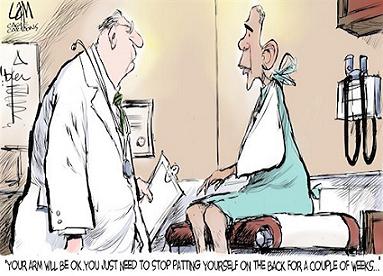 In the 2015 State of the Union, Obama came across as the newest member of Occupy Wall Street but his record shows him to be a corporate liberal, and a closer look at his latest proposals proves it.
In the 2015 State of the Union, Obama came across as the newest member of Occupy Wall Street but his record shows him to be a corporate liberal, and a closer look at his latest proposals proves it.
In exchange for more power and a greater authority to tax, regulate and distribute, Obama will dispense benefits to the top and bottom of society. The poor will receive more generous social welfare benefits, the wealthy will be granted special provisions, exemptions, and benefits, all at the expense of what is left of the middle class.
ObamaCare is a prime illustration of those at the top reaping a private profit for distributing benefits on the government’s behalf. The government subsidizes health insurance through private companies, who agree to participate because it benefits their bottom line. The government, in essence, is guaranteeing that insurers will profit in the individual market.
Far from being a flaw in corporate liberalism, this is its dominant feature. The welfare state is expanded, and powerful corporate interests are drawn into a web of client-patron relationships. The more interests are drawn in, the more our Madisonian system resists reform, and the more ensconced in power corporate liberalism becomes.
Corporate liberalism is generally unpopular. Americans do not like the idea of Uncle Sam guaranteeing the status of private interests so corporate liberals go to great lengths to distract voters from discerning the actual nature of the regime. Again, look at ObamaCare. Its supporters regularly and viciously attacked those “evil” insurance companies during the debate over the bill even as government was establishing a backstop for insurers’ profits.
This sleight of hand, essential to the corporate liberal’s public persona, was on display during the State of the Union. Obama talked like a populist about taxes, but note his timing. He was calling for massive new taxes on top individual earners from the most Republican Congress in generations, which he knows will reject his proposals. Yet his rhetoric was not empty. It served a purpose.
By presenting a tax package with no chance of passage, Obama undermines the slim hope that this Congress will enact real tax reform. He may claim that he is committed to fairness but his publicity stunt probably ensured that our deeply unfair corporate tax code will remain intact for at least another two years. The sectors of corporate America that spend through the nose on lobbyists to protect their tax benefits must have been delighted. And I suspect that is just what Obama wanted!
On Dodd-Frank, too, Obama talked like a populist. He touted Dodd-Frank for bringing Wall Street to heel, but his claims are specious. While Dodd-Frank layered regulations on Wall Street, they were just the wrapping paper that hid the true gift, the too-big-to-fail protection for the largest firms who had contributed lavishly to Obama’s 2008 presidential campaign and who had close ties to his top economic advisers when Dodd-Frank was being written.
When push comes to shove, corporate liberals and corporate conservatives do not really want tax reform. Horizontal equity may be good for the country, but it is bad for them. To borrow a line from Rod Blagojevich, tax preferences are a valuable thing; you don’t just give them away. While Obama would not put things so bluntly, the fact remains that he is a corporate liberal.
You can read the rest of the article by Jay Cost at the Weekly Standard, “Barack Obama, Corporate Liberal”

